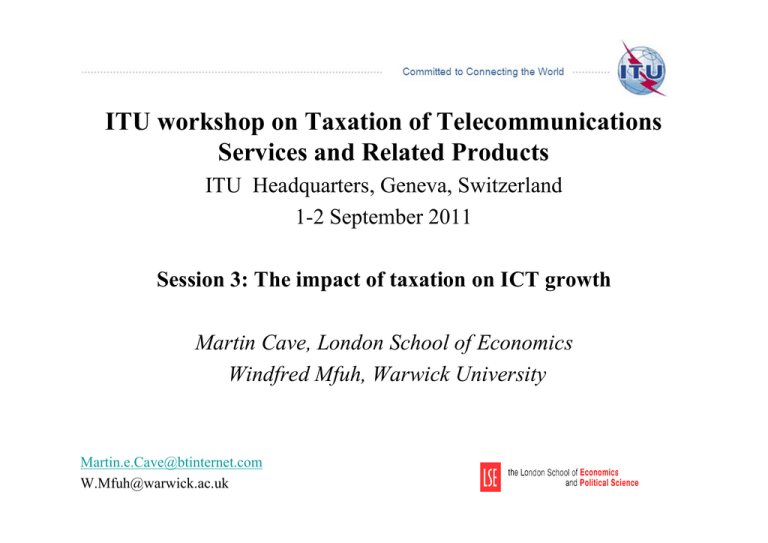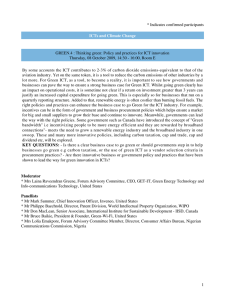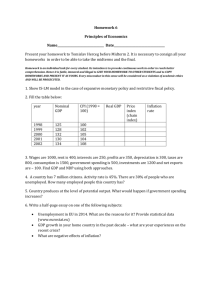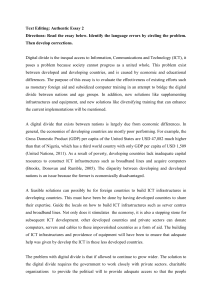ITU workshop on Taxation of Telecommunications Services and Related Products
advertisement

ITU workshop on Taxation of Telecommunications Services and Related Products ITU Headquarters, Geneva, Switzerland 1-2 September 2011 Session 3: The impact of taxation on ICT growth Martin Cave, London School of Economics Windfred Mfuh, Warwick University Martin.e.Cave@btinternet.com W.Mfuh@warwick.ac.uk This session’s goal • To establish why there might be a wider effect on growth from telecom/ICT diffusion • To consider its probable magnitude • To evaluate the impact of this effect on the desirability of special telecoms taxes 2 Telecom/ICT diffusion and growth • Increased expenditure on telecoms/ICT may have an impact on growth of gross domestic product (GDP), beyond what is implied by the standard direct demand. • This implies the existence of a ’spill-over’ mechanism which covers part or all of the the rest of the economy. If this positive feedback is at work, it would be an argument against taxing telecoms/ICT. • How might this work? We first address the question in relation to broadband. What are the transmission mechanisms mechanisms for broadband? • Broadband is, like electricity, a ‘general purpose technology in consumption and production.’ Its effects include: -enhanced speed and quality of information flows - better access to markets - new business processes and organisational structures - more innovation in general The evidence • This includes studies on fixed voice, mobile voice and (so far, mostly fixed) broadband. • Because wireless is the overwhelmingly dominant technology (5bn. lines vs. 1bn.), mobile evidence is most important. We have it for voice but not for data applications. • Studies are both ‘micro’ (at firm or user level) and ‘macro’ (economy-wide). Micro evidence on mobile voice • Famous study of Indian ocean fishing show how mobile connection can empower supply side and improve incomes and efficiency (Jensen, Quart. Jnl. Econ. 2007) • Evidence collected by Dr. Windfred Mfuh on effect of mobile connectivity on small businesses in Cameroon and Afghanistan – see following slides. Micro evidence on mobile voice… • Investigated the structural relationship between mobile telephony services and business performance of the micro-enterprise by analysing mobile phone call log and survey data collected from a random sample of 210 micro-business entrepreneurs representing a broad spectrum of industries across Afghanistan and Cameroon. • The findings suggest that the integration of mobile telephony services into business processes is significantly and positively related to perceived enhanced micro-business performance. In particular, the ability to use mobile telephony services innovatively can enhance business performance by as much as 40 percent. Mobile telephony services enhance business performance • Mobile telephony services contribute to the acquisition of new customers, increase knowledge sharing within the micro-business, contribute to the reduction of information asymmetries and cost, and also increase operational flexibility, which all combine to enhance perceived business performance. – increasing operational flexibility by 32.4%. – reducing operational costs by 35.5 % – reducing information asymmetries by 30.0 % – On average, a MOM saves 2.8 business hours and 33.6 business kilometres per day by simply using mobile telephony services. Reasons for explosive growth Explosive Mobile growth.. but demand is still outgrowing supply subscribers in emerging markets have embraced mobile services at the same rate as seen in developed markets … but infrastructure has not developed at the same rate. Explosive Mobile growth.. but affordability is still an issue although prices are going down. Policy can significant improve access and usage: -spectrum, taxes, overall ease of doing business, a more entrepreneurial approach to regulation. Macro evidence on contribution of ICT to growth • Data mostly from Europe and US. • In US, ICT accounted for 50% of labour productivity growth form 1995 and 2000, and 33% form 2000 and 2005. • Effect much smaller in Europe, an dderived more from making ICT (eg Dell computers in Ireland) than from using ICT. • It is suggested that benefits come from a combination of faster communications and processing Macro evidence on penetration of services Found by estimating equation for a sample of countries in form GDP per capita= f(mobile voice penetration in %, other variables) If the estimated coefficient of the penetration term is 0.1, it means that an increase in penetration from, say, 30 to 31% increases GDP by 0.1%. Or a 10% increase from 30 to 40% increases GDP by 1%. ITU/InfoDev Estimates %age increase in economic growth per 10% increase in penetration in: Fixed Mobile Internet Broadband Countries with high incomes low incomes 0.4 0.6 0.8 1.2 Broadband: a platform for progress, June 2011 0.7 0.8 1.1 1.4 How reliable are the estimates? Estimates of the effect of a 10% change in penetration vary widely, from a 0.2% to a 1.5% change in GDP. Evidence on the most relevant application, mobile broadband, (beyond smart phones) is very sparse. Probably safe to conclude that there is an effect, but of unknown magnitude. How does it affect the tax debate: a worked example Assumptions. GDP=100; taxable broadband output =2; penetration rate =30%; price elasticity of demand =0.6; marginal tax rate in economy is 35%; growth effect: cutting penetration from 30 to 20% reduces GDP by 1%. Arithmetic. 1) A 20% tax borne by consumers reduces demand by 12%, cuts penetration by 3.6% to 26.4%, and raises 0.2 x 0.88 x 2, or 0.35 units of tax. 2) GDP falls by 0.36 x 1%. As a result tax falls by 0.36 x 35% or 0.13 units. 3) Overall, GDP falls by 0.36; tax revenue rises by 0.22. Sensitivities Sensitivity Higher price elasticity of demand Higher share of broadband in GDP Higher tax rate on communications Higher marginal GDP tax rate Growth effect Tax effect + - 0 + - ? 0 + +, increases; -, decreases; 0, no effect; ?, ambiguous. Will imposing a tax reduce tax revenue? • This can happen if the tax collected on telecoms service is outweighed by tax foregone on ‘lost’ GDP. • Some studies have suggested that it does happen – eg in 4 countries out of 5 in a detailed study by Katz et al. for GSMA. • The growth effect will still take time to work through, and the government may be impatient or needy. • A tax cut will not normally be the only reasonable choice.





